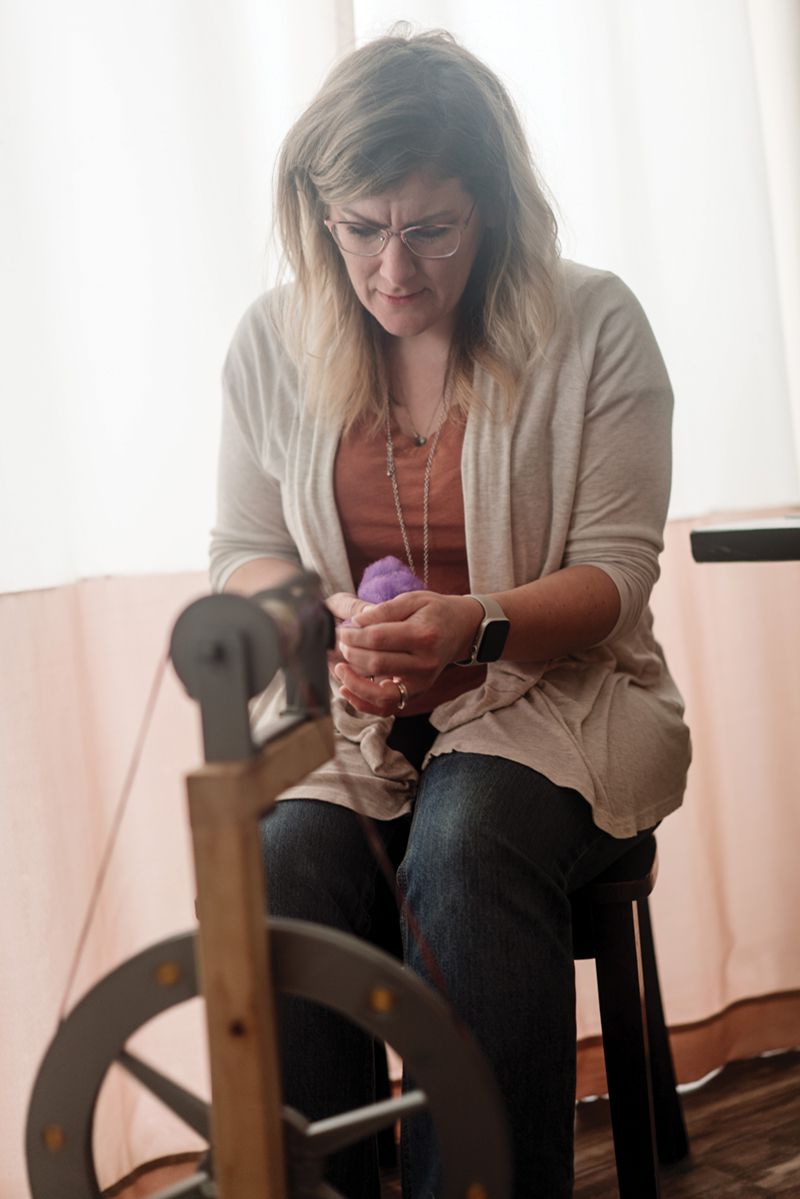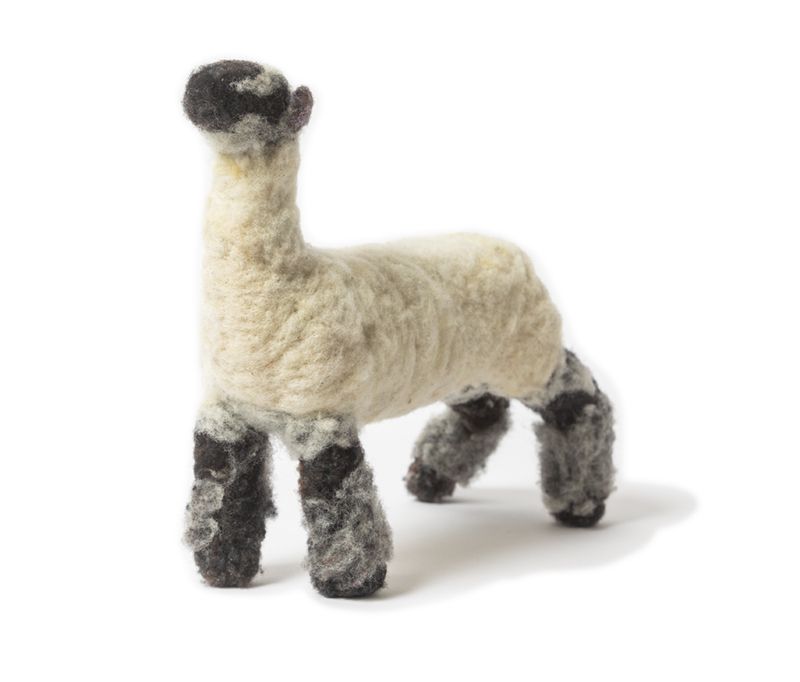The Family that Flocks Together
Author
Published
3/6/2023
Amanda Cook has always been a self-starter. As a young girl, she would sneak out to the barn on her grandparents’ farm in Lindstrom and teach herself to shear sheep, even when others told her she was not yet old enough. Once she got her driver’s license, Amanda carted their sheep around to various shows, networking with and learning from other farmers.
Today, Amanda has her own farm in Almelund, which she runs with her husband Adam while also raising three kids, teaching in their local school district, participating in the Minnesota farming community and, her latest endeavor, crafting needle-felted sculptures and kits made from her flock’s wool.
“Farming has been a constant in my life,” says the 35-year-old, getting emotional as she reflects on her lifetime as a farmer. “I really enjoy the process of raising the animals and working with them and learning with them. You’re forming a bond with them and you care about them like they’re members of your family.”
A Family Tradition
Amanda credits her grandparents with instilling her love for farming. “Their life could have made a really great TV show back in the day,” she says. “They just decided one day they were going to pack everything up and move north of the Cities, to an area that wasn’t really well populated yet, and buy a farm. I think my grandpa actually picked up a few sheep and didn’t tell my grandma.”
After Amanda’s grandma, Virginia Hughes, became a widow in 1986—two years before Amanda was born—she continued to run the 120-acre hobby farm that would become Amanda’s playground. “I spent every moment I could at my grandparents’ house,” Amanda recalls. “My grandma has always been really strong and independent. She did everything on the farm, just her and the kids, after my grandpa passed.”
It was there that Amanda kickstarted her own career in agriculture. An active member of 4-H and FFA, she followed in her mom’s footsteps, showing their sheep at county fairs any chance she got. When she was old enough to start earning money, Amanda began investing in their flock to improve its show quality.

“Farming has been a constant in my life. I really enjoy the process of raising the animals and working with them and learning with them.”
—Amanda Cook
Virginia convinced Amanda to keep a handful of sheep on the farm, promising she’d look after them. “You get an idea when you’re young and think, ‘Yeah, I’m done. I’m going to move on and do this with my life now.’ But sometimes I think the adults in your life know better,” Amanda says.
Virginia cared for the sheep for 10 years as Amanda pursued a degree in agricultural education from the University of Minnesota–Twin Cities, got married, started a family and, eventually, purchased her own farm with her husband Adam, a city kid who had never stepped foot on a farm before he met Amanda. “The three sheep we started with were descendants of the ones I had worked so hard to build bloodlines for [as a teenager],” she says.
Life on the Farm
A 10-minute drive from her grandparents’ original farm, which has downsized to 60 acres, Amanda and Adam have been running the five-acre Cook family farm in Almelund since 2017. They’re raising their family’s fourth generation of farmers, teaching Henry (9), Emma (7) and Mirella (5) how to care for the flock and encouraging their interest in showing sheep at youth livestock events.
“There’s so much value in raising livestock,” Amanda says. “I think it really humbles a person, and teaches them about the value of hard work and the importance of following through. The animal depends on you, and if you don’t do what you’re supposed to, things don’t work out.”
Since acquiring the three sheep and a ram from her grandmother, the Cook’s flock has grown to 20 ewes. Raised on a pasture and fed a diet of high-protein grain rations, the primary purpose of these Hampshire sheep is to produce meat, but Amanda recently started thinking about how she could use the hundreds of pounds of wool they shear every year so it doesn’t go to waste. Ignoring the preconceived notion that the wool from her breed of sheep—typically coarser than the coat of, say, a Merino or Corriedale—is worthless, she purchased a build-it-yourself spinning wheel in the winter of 2021.
“I started going through the bags of wool we had out in the barn and slowly learned how to scour it in the best way, card it, and spin,” she says. “Luckily, in the world we live in, you can find almost anything on YouTube, so I just kept trying different things and seeing what I liked.”
Amanda now sells dyed yarn, carded wool, commissioned sculptures and kits, so even beginners can needle-felt creations like pumpkins, llamas, owls and penguins.
“I’ve just always been somebody who wants to know the way things work,” she says. “I want to try to find different ways of doing things. Life is a big science experiment. If I do this, what will happen? I think that’s what makes it exciting, knowing that no matter what you’re doing, there’s always potential for growth. You can always get better. There’s no end to the learning.”
Making an Impact
Outside of their farm, Adam works in commercial roofing while Amanda teaches middle and high school students in the North Branch school district, where she lobbied administrators and the superintendent to reestablish the agricultural program that was cut years ago due to funding.
“We have a huge ag base here. There’s a lot of farmers and people that depend on agriculture for their livelihood, so it seemed like a logical fit,” Amanda says. “The big thing I impress upon my students is that it’s important to know where your food comes from and what route it takes to get from the farm. One hundred years ago, we didn’t necessarily have as much of a need for a class like this because a lot of kids went home at the end of the day, and their family had livestock or their family had a garden. The way the world has changed, a lot of people don’t have that experience.”
The Minnesota Farm Bureau Federation has also given Amanda an outlet to educate her peers, make an impact on the farming community and foster connections for herself. When she joined the MFBF State Board of Directors in 2021—she recently completed her one-year term in November 2022—Amanda was at a low point. A mom of three young children that depended on her, plus a farm full of animals, she felt lost and craved something that was just hers.
“Every time I’ve time had a tougher time, it’s my involvement in this organization that helps me to see it through,” she says. “It’s the bonds I’m forming with these people, or someone that helps you to see there’s hope for tomorrow.”
Through the MFBF, Amanda has also served on the Promotion & Education Committee since 2020; attended the Leadership, Education, Advocacy and Promotion Conference; and was a top-three finalist in the Young Farmers & Ranchers Discussion Meet, a competition that judges contestants on their basic knowledge of critical farm issues and their ability to exchange ideas to problem-solve.
It was Amanda’s personal experience with mental health, however, that inspired her most impactful contribution to the MFBF. While she served on the board, Amanda and her committee crafted mental health monthly awareness posts for social media that included information on where to find local support groups and resources.
“Farm Bureau was the thing I didn’t know I needed in my life," she says. “They say Farm Bureau is like family. That’s exactly what it is. It’s a bunch of people that are like-minded, that have an interest in agriculture. Agriculturalists are people who know so much about the lessons of life. You know, stuff goes wrong, and a lot of times you have your hopes just stomped into the ground. But the thing that makes farmers unique is that every day they get up and try again. I don’t think you’re going to find anybody that’s got faith like a farmer does.”
Getting Crafty
 The Cook family shears hundreds of pounds of wool every year. When Amanda wanted to spin and process her wool, she used a plan from a company called Good and Basic to make a 3D-printed spinning wheel in the winter of 2021. “It’s a simple design, but good for making some chunky, handspun yarn,” she says. “It’s great for a beginner.” She sells dyed yarn, carded wool and commissioned sculptures and kits at cookfamilyfarmmn.com/products
The Cook family shears hundreds of pounds of wool every year. When Amanda wanted to spin and process her wool, she used a plan from a company called Good and Basic to make a 3D-printed spinning wheel in the winter of 2021. “It’s a simple design, but good for making some chunky, handspun yarn,” she says. “It’s great for a beginner.” She sells dyed yarn, carded wool and commissioned sculptures and kits at cookfamilyfarmmn.com/products
